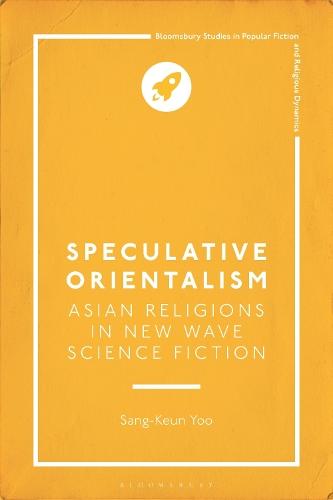Overview
Examining the works of prominent New Wave science fiction authors from the 1950-1960s, Sang-Keun Yoo highlights the underexplored connection between American science fiction and Asian religions, such as Taoism, Buddhism, and Hinduism.The book considers how the major world wars of the 20th century—Second World War, the Cold War, and the Vietnam War— repositioned Asian culture in relation to the science fiction genre in the period. Underpinning this study, Sang-Keun Yoo argues that “Speculative Orientalism” emerged in American science fiction during the 1950s and 60s. This concept adopted various aspects of Asian religions to envision alternative worlds, unburdened by the constraints of colonialism, totalitarianism, racism, and sexism present in contemporary American society. Bringing fresh perspectives to the works of William S. Burroughs, Philip K. Dick, Ursula K. Le Guin and Samuel R. Delany, this book offers an insightful examination of the role of Asian religions in American science fiction and their impact on the genre's history.
Full Product Details
Author: Sang-Keun Yoo (Assistant Professor of English, Marist University, USA) ,
Alana Vincent (Umeå Universitet, Sweden) ,
Nina Fischer (“Religious Positioning” Research Hub, Goethe University Frankfurt, Germany)
Publisher: Bloomsbury Publishing PLC
Imprint: Bloomsbury Academic
Dimensions:
Width: 15.80cm
, Height: 2.00cm
, Length: 23.60cm
Weight: 0.680kg
ISBN: 9781350447899
ISBN 10: 1350447897
Pages: 248
Publication Date: 18 September 2025
Audience:
College/higher education
,
Postgraduate, Research & Scholarly
Format: Hardback
Publisher's Status: Active
Availability: Manufactured on demand

We will order this item for you from a manufactured on demand supplier.
Reviews
Through wide-ranging readings of major New Wave SF writers, Sang-Keun Yoo reveals how imaginations about “Asian civilization” have functioned as a signifier of radical alterity and racialized futurity in what is arguably the most critically significant period of American and British science fiction. Bridging postcolonial theory, Asian American studies, and critical SF studies, this rigorous book reframes the global politics of genre fiction and expands the critical horizons of both ethnic and Asian studies. Speculative Orientalism is essential reading for anyone interested in the cultural politics of science fiction, the racial imaginaries of empire, and the shifting place of traditional religion in speculative world-building * Dr. Sunyoung Park, University of Southern California, USA * Speculative Orientalism shows how profoundly ideas from Asian cultures transformed Western SF during the influential New Wave era, while adding complexity to our understanding of racialized stereotypes by analyzing this neglected period between the “yellow peril” of early SF and the techno-Orientalism of cyberpunk. Adeptly illustrating the continuing legacies of the speculative Orientalist trope, the book requires us to rethink SF history in light of the significant impact that US military intervention in Asia had on American ways of imagining the future. * Dr. Sherryl Vint, University of California, Riverside, USA *
Author Information
Sang-Keun Yoo is Assistant Professor of English at Marist University, USA. He has published several articles in Science Fiction Film and Television and other notable publications. He is the Korea Representative for the Science Fiction Research Association



